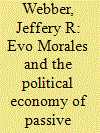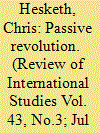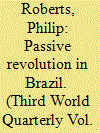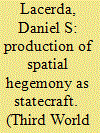| Srl | Item |
| 1 |
ID:
148273


|
|
|
|
|
| Summary/Abstract |
While the government of Evo Morales rules in the name of indigenous workers and peasants, in fact the country’s political economy has since 2006 witnessed the on-going subjugation of these classes. If the logic of large capital persists, it is legitimated in and through petty indigenous capitalists. This article argues that Antonio Gramsci’s conceptualisation of passive revolution offers a superior analytical point of departure for understanding contemporary Bolivian politics than does Álvaro García Linera’s more widely accepted theory of creative tensions. However, the dominant manner in which passive revolution has been employed in contemporary Latin American debates has treated the socio-political and the ideological as relatively autonomous from the process of capital accumulation. What is necessary, instead, is a sharper appreciation of the base/superstructure metaphor as expressing a dialectical unity of internal relations between ‘the economic’ and ‘the political’, thus avoiding one determinism or another. Through a reading of Gramsci that emphasises such unity, this article interrogates the dynamics of ‘extractive distribution’, class contradictions of the ‘plural economy’, and transformations in the urban labour market which have characterised Bolivia’s passive revolution under Evo Morales between 2006 and 2015.
|
|
|
|
|
|
|
|
|
|
|
|
|
|
|
|
| 2 |
ID:
101593


|
|
|
|
|
| Publication |
2010.
|
| Summary/Abstract |
The Global Political Agreement (GPA) signed between the two Movements for Democratic Change and the Zimbabwe African National Union-Patriotic Front (ZANU-PF) set the change for a new set of political dynamics in Zimbabwe. Although it has not transformed the coercive base of ZANU-PF's support, it has led to new battles for state power and changes in the strategies of the major political parties. The discussion below uses the great Italian Marxist Antonio Gramsci's conception of the 'passive revolution' to understand the changes in the political economy that have marked recent Zimbabwean politics, looking in particular at the different approaches of the three parties to the GPA during this period.
|
|
|
|
|
|
|
|
|
|
|
|
|
|
|
|
| 3 |
ID:
153253


|
|
|
|
|
| Summary/Abstract |
In this article, I argue that Antonio Gramsci’s concept of passive revolution makes a foundational contribution to International Relations (IR), yet has been relatively under appreciated by the broader discipline. Within the Historical Sociology of International Relations, uneven and combined development has recently been postulated as a key trans-historical law that provides a social theory of the ‘international’. Drawing from, but moving beyond these debates, I will argue that passive revolution is a key conditioning factor of capitalist modernity. I will demonstrate how the concept of passive revolution is the element that explains the connection between the universal process of uneven development and the manner in which specific combinations occur within the capitalist era as geopolitical pressures, in tandem with domestic social forces become internalised into geographically specific state forms. It therefore offers a corrective to the frequently aspatial view that is found in much of the literature in IR regarding uneven and combined development. Additionally, passive revolution provides a more politicised understanding of the present as well as an important theoretical lesson in relation to what needs to be done to affect alternative trajectories of development.
|
|
|
|
|
|
|
|
|
|
|
|
|
|
|
|
| 4 |
ID:
141138


|
|
|
|
|
| Summary/Abstract |
This article examines transformations of the role of religion in Brazil, focused on two transitions within the national political economy. A Gramscian framework of analysis is used to investigate the shift from import substitution industrialisation to neoliberalism, and the varying role of religion within class struggles in each period. The central argument is that Brazil has moved from a period of ‘passive revolution’ to one of ‘hegemony’, and that the role of religion has changed significantly in this period. The article examines ideas, institutions and social forces, with particular attention to the Landless Workers Movement and its relationship with Liberation Theology.
|
|
|
|
|
|
|
|
|
|
|
|
|
|
|
|
| 5 |
ID:
144281


|
|
|
|
|
| Summary/Abstract |
In recent years Brazil has deployed a military takeover of dozens of favelas. Presenting data collected from 2012 to 2014 in one of the favelas, I argue that the process of ‘pacification’ is an attempt at passive revolution, which depends more on manufacturing spatial hegemony through non-military strategies than on the war of manoeuvre that is currently being undertaken. This is developed through an articulation of Gramsci’s theoretical framework with Lefebvre’s perspective of the production of space, which exposes the failure to overcome the fragile presence of state in the territory through everyday state formation.
|
|
|
|
|
|
|
|
|
|
|
|
|
|
|
|